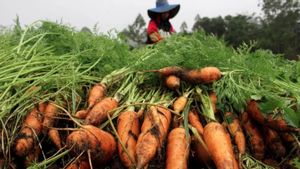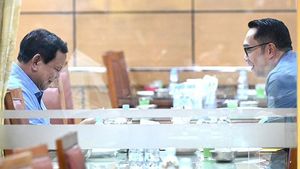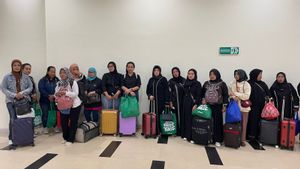JAKARTA Dairy cow farmers in Central Java and East Java bathe in milk produced. Local cow milk is said to be less quality than imported milk so that production is not absorbed. What is the fate of Free Nutrition Food (MBG) which is the mainstay program of the Prabowo Subianto and Gibran Rakabuming Raka governments?
Video of a number of dairy farmers flushing their bodies with cow's milk attracts the public's attention. The milk bath action carried out by dairy farmers took place on Saturday (9/11/2024) in Boyolali, Central Java.
From the video, dozens of pickup cars can be seen loading fresh milk lined up along the road. About 50 thousand liters of milk were wasted in the action. Apart from being used to bathe in milk, they also distributed free fresh milk to residents at Simpang Lima Boyolali.
According to one dairy farmer, Danu Nugroho, this action is a form of concern because since September 2024 local cow's milk has often been rejected by the dairy processing industry or IPS.
This milk bath phenomenon occurs in the midst of preparation for free nutritious food which will begin to be held next year. Executive Director of the Center of Economic and Law Studies (CELIOS) Bhima Yudhistira said the phenomenon of farmers throwing away cow milk was the first blow to Prabowo's food security program.
Anxiety among local dairy farmers was triggered by various things. The first is about importing cow's milk in a row. This step was taken because local milk production has not been able to meet national milk needs.
According to data from the Central Statistics Agency (BPS), the national demand for milk reaches 5.78 million tons each year. It consists of 4.6 million tons of regular milk needs, plus 1.18 million tons for elementary school students in a free nutritious eating program.
Meanwhile, domestic production is only 0.9 million tons. This means that there is a shortage of 4.88 million tons or the equivalent of 1.25 million lactation cows. This lack of milk is supplied from abroad such as Australia, New Zealand, and European countries.
Meanwhile, in terms of the dairy processing industry, the reduction in local cow's milk absorption is due to its quality that does not meet standards, as stated by the Executive Director of the Association of Milk Processing Industries or AIPS, Sonny Effendhi.
The dairy processing industry prefers milk from abroad because according to Sonny, the quality of domestic farmers' milk is not in accordance with the company's quality. Domestic farmer's milk contains ingredients that are not safe when consumed so it is not in accordance with food safety standards or food safety.
Sonny revealed that domestic milk tends to contain water, sugar supplements, and others. Whereas the standards of the Food and Drug Supervisory Agency (BPOM) do not allow these ingredients in milk.
SEE ALSO:
Sonny emphasized that pure milk produced by farmers is in accordance with standards. But this is not reflected in the majority of milk deposited into the manufacturer because it is an individual in the supply chain.
"I say, not all cooperatives add cypress. If cooperatives have followed standard operating procedures, the quality results will definitely be in accordance with standards," he said.
Sonny also denied that the industry chose imports because the price was cheaper.
Regarding the quality of local cow's milk which is considered underapproved by Minister of Agriculture Andi Amran. He said the local cow's milk quota was limited due to its poor quality. However, he emphasized that when the quality is improved, the tap for importing cow's milk can be limited. Andi Amran even targets cow's milk imports to be only 40 percent if the dairy processing industry is able to absorb local cow's milk.
Minister of Agriculture Andi Amran has also immediately suspended import permits for five milk companies. The goal is for the company to absorb domestic milk production. He threatened to permanently revoke import permits if during the suspension the company insisted on absorbing local milk.
From a farmer's point of view, the quality of local cow's milk is said to be less due to several factors. Starting from the absence of protection from the government, to the increase in imported milk, especially those in the form of dry or powder skims, which are cheaper, causing unhealthy competition.
In addition, the maintenance of local breeders is also not as good as breeders abroad, resulting in poor dairy seeds or saplings and low milk production.
The commotion about beef milk imports has disturbed the Prabowo government's free nutritious food policy, which will debut next year. However, the Head of the National Nutrition Agency Dadan Hindayana remains optimistic that the free nutritious eating program can absorb local cow milk, so that farmers don't have to worry.
Meanwhile, the Executive Director of CelIOS Bhima Yudhistira said the phenomenon of farmers throwing milk was the first blow to Prabowo's food security program.
"The solution is to encourage SOE ID FOOD because it has collaborated with PTPN Holding, FrieslandCampina, and HVA International BV to provide milk in a free nutritious food program," Bhima told VOI.
Bhima also encouraged companies and the government to prioritize partnerships with farmers, because at the time of the MBG kingpin, the government signaled that milk imports would damage the partnership mechanism of local breeders and companies.
If the company's case reduces the purchase of farmers' milk and chooses to import, it is feared that the fulfillment of milk for MBG will be fully imported. This is not food security but a massive milk import chain, Bhima added.
To reduce the fuss over beef milk imports, it does require cohesiveness between ministries to ensure the quality of local cow's milk produced according to the needs of the community.
The English, Chinese, Japanese, Arabic, and French versions are automatically generated by the AI. So there may still be inaccuracies in translating, please always see Indonesian as our main language. (system supported by DigitalSiber.id)












